On 2 October 2025, the International Urban and Regional Cooperation (IURC) Asia & Australasia programme held its first Deep Dive Session on Circular Economy (Cluster 4), focusing on waste and water management strategies. The event brought together 50 participants from Europe and Asia and showcased how cities are pioneering new approaches to transform waste into resources and wastewater into energy, while strengthening international cooperation.
Setting the Stage: From Waste to Resource
The session was opened by Ms. Jacqueline Chang, Cluster Manager for Circular Economy, who thanked participants, including officials from India joining despite their national holiday. She emphasized the need to change perceptions of waste and wastewater: “Most of the world’s wastewater is neither collected nor treated. Cities must reframe waste as a valuable resource,” she noted.
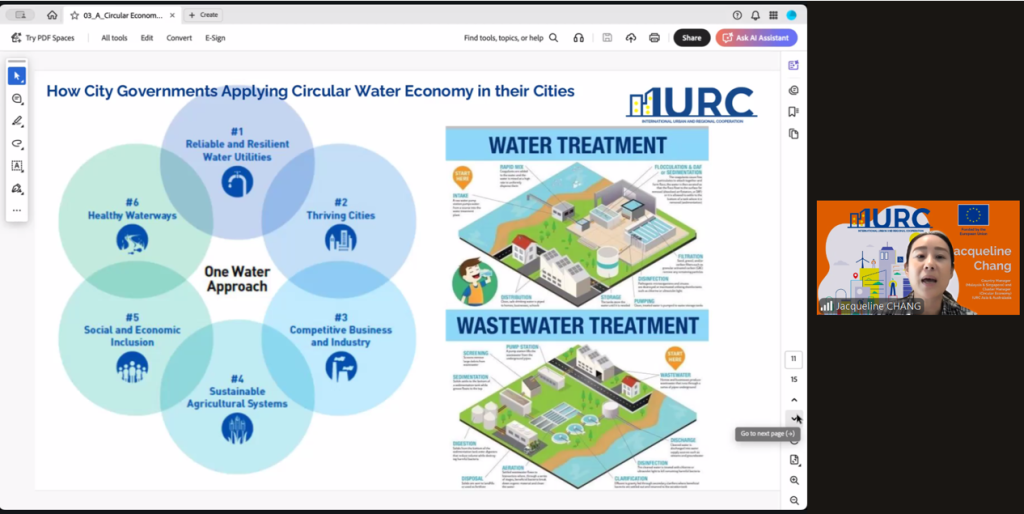
Mr. Ashish Verma, Country Coordinator for India, introduced the speakers, highlighting the importance of technical exchanges in helping cities tackle pressing environmental challenges.
Jabalpur: Waste-to-Energy Leadership in India
Mr. Sambhav Ayachi, Deputy Municipal Commissioner, Jabalpur, presented the city’s impressive achievements in integrated solid waste management. Jabalpur has implemented a waste-to-energy plant processing 600 tonnes per day, producing 11.5 megawatts of electricity per hour.
The city has achieved nearly 100% door-to-door waste collection and improved air quality by 18%, while ensuring sanitation worker safety. Jabalpur also operates a flower-processing unit employing marginalized women. Looking ahead, the city aims for zero landfill waste by scaling up home composting and increasing waste segregation to 100%. Mr. Ayachi also highlighted Jabalpur’s role in the EU-funded Cities 2.0 project and its engagement with the Milan Urban Food Policy Pact.
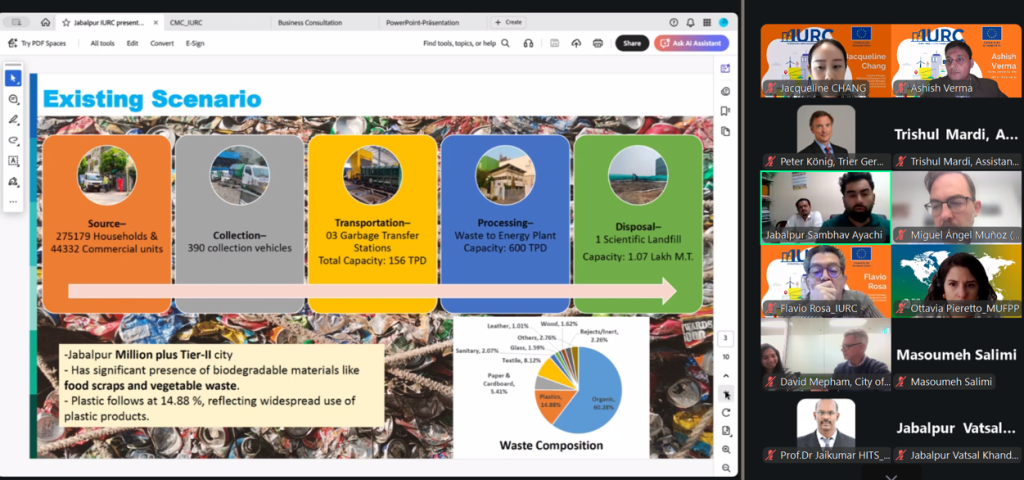
Madrid: Smart City Solutions for a Circular Future
Mr. Miguel Ángel Muñoz, Advisory Board, General Directorate of International Relations, Mayor’s Office, Madrid, presented the city’s ambitious Madrid 360 Sustainability Strategy. Key initiatives include:
- Energy production from organic waste
- Water reuse systems
- AI-powered waste inspection vehicles
- Smart trash bins with sensors
- Digital twin technology for better planning and decision-making
Madrid has also established a Circular Economy Innovation Centre (CEIC) to foster entrepreneurship, job creation, and innovation. Mr. Muñoz stressed the city’s interest in international cooperation: “We want to learn from other cities and share our experiences in circularity and smart solutions.”
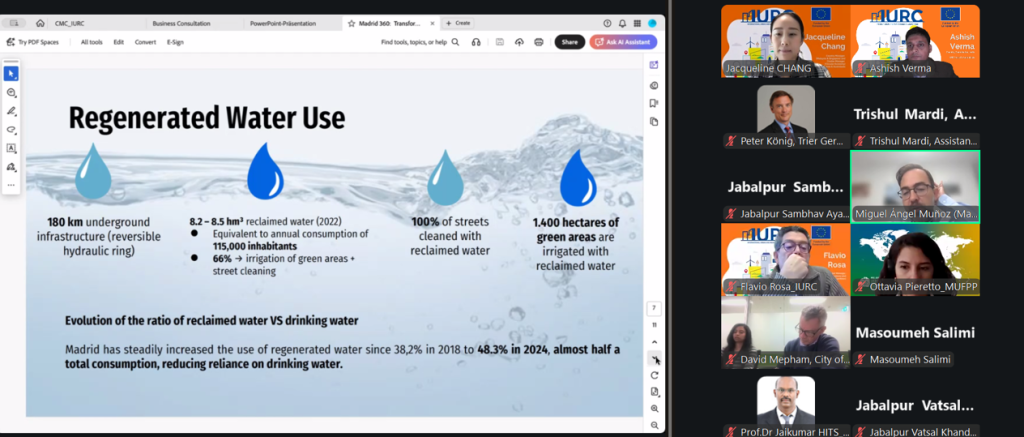
Cuttack: Overcoming Urban Waste Challenges
Mr. Trishul Mardi, Assistant Commissioner, Cuttack Municipal Corporation, outlined the challenges facing Cuttack, a millennium city of over one million people. The city generates 300 tonnes of waste daily but currently processes only 130 tonnes, leading to landfill pressures.
To address this, Cuttack is building micro-composting plants, developing an eco-park for e-waste and construction waste recycling, and partnering to establish a compressed biogas plant. Mr. Mahdi shared aspirations to pilot innovative solutions such as black soldier fly larvae for waste processing, while seeking international technical and financial support.
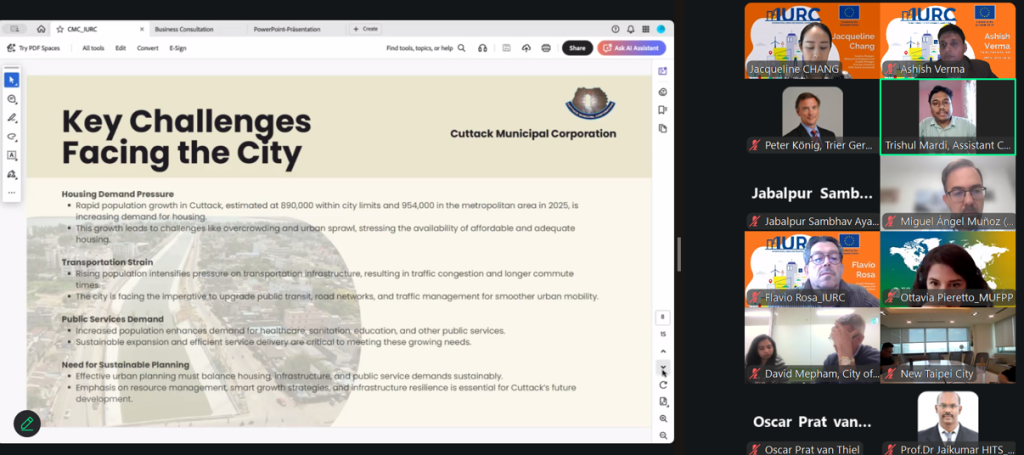
Debrecen: Tackling Water Scarcity with Innovation
Ms. Dorottya Horváth, Senior Expert, Urban Development, Debrecen (Hungary), presented two flagship initiatives: a greywater reuse system to reduce industrial consumption, and a new eco-park using treated wastewater and rainwater. She outlined the city’s learning goals, including mapping financing resources and strengthening citizen engagement. “Debrecen seeks partners to help us scale our water management innovations,” she noted.
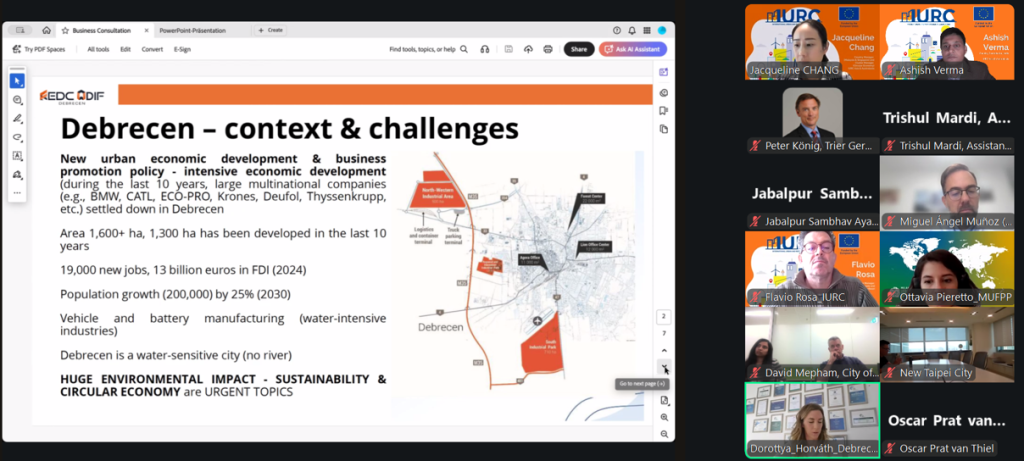
Trier and Chennai: Academic–Industry Collaboration for Renewable Energy
Professor Dr. Peter König, University of Applied Sciences, Trier, presented Trier’s sustainability achievements, including its top ranking in the German Smart City Index. He described a renewable energy grid integration project with partners in Chennai, India, exploring modular energy centres, solar and wind integration, and biomethane production.

Professor König emphasized the triple helix model (academia, industry, utilities) as key to success, while announcing collaboration with colleagues including Dr. Felix Bentgens, Ms. Elisa Limbacher, Mr. A.S. Murugan, Dr. Pradeep Bhaskar, and Prof. Dr. M. Jaikumar. Together, they plan to scale projects on sustainable construction, decentralized energy storage, and biomethane technologies.
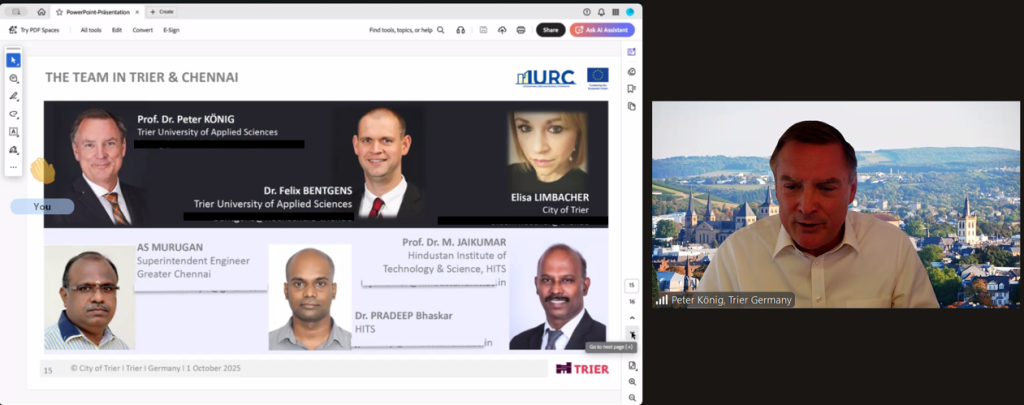
Financing and Next Steps
The session also discussed project financing strategies. Mr. Muñoz explained that most of Madrid’s digital strategy is publicly financed, with some European funds covering IoT interoperability.
Looking ahead to the Smart City Expo World Congress in Barcelona (4–6 November 2025), participants outlined the following actions:
- Jabalpur to deepen partnerships with Milan and Madrid on waste segregation.
- Cuttack to seek support for processing C&D, plastic, electronic, and garden waste.
- Debrecen to explore financing options for water management.
- Trier and Chennai to advance their renewable energy cooperation.
- Iskandar Malaysia to connect with Madrid and Debrecen for collaboration.
- Cluster sub-topic groups to be formed under volunteer leadership.
